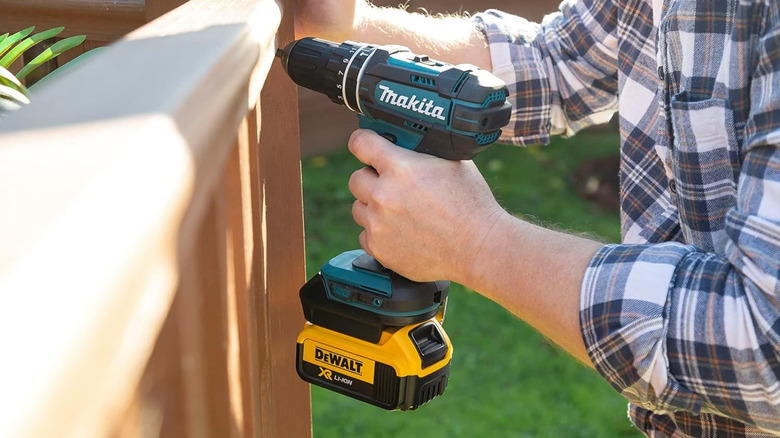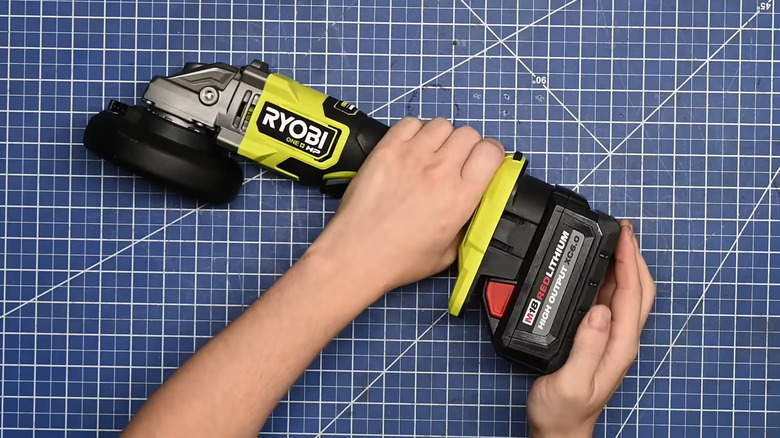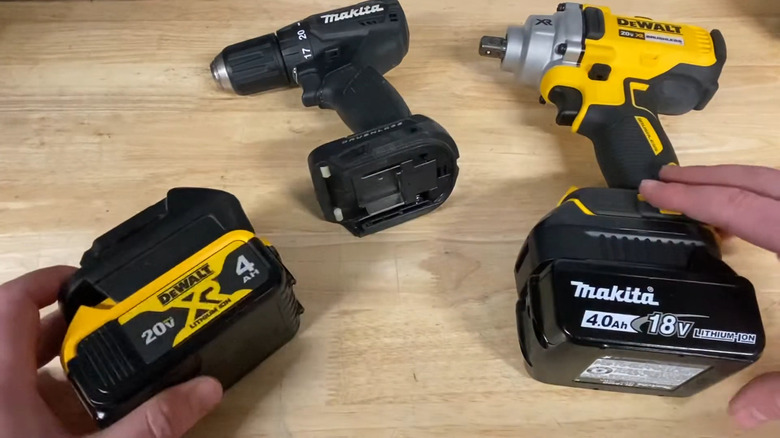Power Tool Battery Adapters: What Are The Pros & Cons Of Using Them?
We may receive a commission on purchases made from links.
It's not uncommon to have more than one power tool brand in your garage. After all, not all tools are created equal. Some are designed for comfort; others for performance. So, depending on your needs and preferences, you might reach for one brand for a drill driver but lean towards another for lawn mowers. In these cases, you'll end up with batteries from more than one power tool brand, too. Maybe you have some Ryobi 18V ONE+ packs for your lighting solutions, and then a set of Milwaukee M18 batteries for your woodworking equipment.
Having multiple brands is all fine and dandy until you see the cost add up from buying separate chargers and replacement batteries. So, what if you could just mix and match your power tools and batteries from different brands? Say, connect a DeWalt battery to a Hercules ratchet, or a Makita battery to a Craftsman saw?
That's where power tool battery adapters come into the picture. A power tool battery adapter lets you use any power tool battery with almost every major tool brand. You just snap it on the battery from brand X to make it fit the battery port from brand Y. A quick browse online and you'll find a variety of battery adapters for different brands. But are these even safe? What are the pros and cons of using a battery adapter for your power tools?
The benefits of using power tool battery adapters
Probably the biggest pro to using power tool battery adapters is the cost savings. Instead of spending on a new set of batteries and chargers for each brand you own, you could simply share one brand's battery packs across your different tools. Just make sure they have the same voltage. Other than saving money, having fewer batteries and chargers means you can simplify your storage and organization. You won't have to deal with redundant battery types and chargers cluttering your space, which is especially convenient if you're working in a small garage or shed. Then, there's also the increase in productivity and decrease in downtime. Whenever your battery dies in the middle of a task and your spares are also empty, it's easy to just grab a charged pack from another brand and go on your merry way. No more waiting around for the dead battery to top up.
Another benefit of using power tool battery adapters is that you get to make the most out of what you already own, all while reducing battery waste. Since power tool brands don't offer the same build quality, some packs will inevitably go bad sooner than the others. With a battery adapter, you don't have to keep buying the same, less durable brand and adding to the already growing e-waste. Instead, you can invest in a long-lasting battery brand and use the same packs with your other tools.
The drawbacks of power tool battery adapters
While power tool battery adapters make switching between multiple tool brands convenient, they come with some serious drawbacks. For one, they're not particularly safe to use, especially those from third-party sources (which is nearly all the battery adapters in the market). YouTuber Torque Test Channel tested some power tool battery adapters and found that they can lead to abnormal tool operation, like some unstable oscillations and overheating. The adapter, under typical load, also melted a bit, which can potentially cause a short circuit and start a fire. Decrease in performance is another issue. When paired with a Milwaukee battery via a power tool adapter, a DeWalt circular saw from Torque Test Channel's experiment lost a lot of speed and power.
Some power tool battery adapters are officially supported, though. For instance, there's a DeWalt adapter for using Flexvolt batteries in Powershift tools and another DeWalt adapter for bridging its 18V tools with the 20V batteries. However, these official adapters are few and far between. For the most part, battery adapters are from aftermarket suppliers, so using them with your tool could void your warranty. Besides safety risks and performance loss, power tool battery adapters can make your tools uncomfortable and awkward to handle. Although they're lightweight, they still add extra height between the tool and battery. So if you already have a bulky battery — like the thick 12Ah packs — it will be even bulkier with the adapter. Another thing to keep in mind about power tool battery adapters is that they generally only work for the tools, not the chargers. That means you'll still have to buy the specific charger for the brand of batteries you have.


